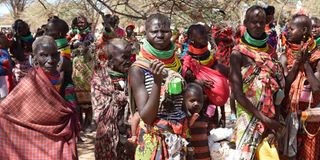Food summits and shame of inaction in face of hunger

Locals wait for their rations of relief food distribution by President William Ruto to hunger victims due to drought, at Nakaalei in Turkana County on November 5, 2022.
President William Ruto last week attended a top-level meeting to discuss the conundrum around food insecurity on the continent.
The African Development Bank-supported Dakar 2 Summit comes six years after Dakar 1, and it was intended to review progress made towards meeting commitments set six years ago. The report card was abysmal.
Last September, the UN organised the Food Systems Summit in New York, which was attended by heads of government to discuss the resilience of global food systems and their capacity to feed growing populations — especially in cities. Held under the shadows of the Covid-19 pandemic, most presentations from experts and organisations on the food situation were worrying. Ironically, the solutions that were suggested were not novel.
The recommendations have not varied much — maybe the emphasis. Spend more on production, improve distribution systems within and between countries, stabilise prices for farmers, improve storage, etc. Donor-supported organisations like AGRA have spent serious money to support country initiatives and help boost state capability to support smallholder farmers in Africa. So much so that it organises an annual event – the AGRF Summit – to sustain focus on transforming agriculture in Africa.
Concern about Africa’s precarious food security situation is not new at all, neither is the realisation that governments must be at the centre of efforts to harness the tremendous opportunity it contains. In fact, Kenya’s first government summarised its priorities as eradication of hunger, disease and ignorance. Sixty years later, all these are still very much a factor.
Decades after independence, and 20 years after the Maputo Declaration where African leaders committed to spending at least 10 per cent of their annual budget on agriculture, only a handful of countries are achieving this target. Senegal at 12 per cent is one of them. Kenya is not.
Yet, Africa’s agricultural potential is enormous. Africa still has 65 per cent of arable land that is capable of feeding nine billion people (pretty much the entire global population, projected to be 9.8 billion by 2050). To eradicate hunger and construct a $1 trillion agriculture-based business by 2050, the continent needs to spend between $28.5 billion and $36.6 billion annually. Instead, it is now home to more than 280 million people that are food insecure and imports 100 million tonnes of food at a cost of $75 billion annually.
Steal through corruption
Why should Africa be spending more money to buy food than it needs to invest in agriculture (especially smallholder farming) and its leaders waste time and resources at summits to discuss what they already know they should do? It surely is not a lack of resources to invest. Africa has more than enough to fund all sorts of low-priority projects and plenty more to steal through corruption.
It is not a lack of knowledge. Numerous studies have identified appropriate interventions for farmers. Through collaborative work involving farmers in many parts of Africa, it has been demonstrated that current farming practices must be replaced by nature-positive approaches that are rooted in the principles of local ownership strengthened by science and an enabling policy environment.
A lot more public and private investments are needed, not only on improving production but to promote scaling and increased adoption of nature-positive systems. Investments in awareness and empowerment are required for a complete transformation of agriculture.
In Kenya, food security (which must translate into significant improvement across the entire agricultural production value chain) has been a priority of successive governments, including President Uhuru Kenyatta’s that exited last year. President Ruto has underscored his own commitment to revolutionise agriculture by promoting the use of fertiliser and improved seeds (through subsidies), expanding areas under irrigation, improving marketing and promoting value addition.
This is all great stuff but will come to naught unless far-reaching and sustainable actions are taken to mitigate the impact of climate change and environmental degradation. It will also be imperative that farmers, counties and even the national government start integrating insurance protection of the investments in agriculture because there will be losses before farmers master the rain patterns and are fully socialised to exploit the opportunity in irrigation.
The sooner African countries can feed themselves the better because, an often-unspoken reason why we must remain hungry and dependent is that the developed world is keen that we remain so, hence the many meetings our presidents are “invited” to in western capitals to be advised, admonished and encouraged to sign skewed bilateral deals. Food is always a factor in most of them.
“A country must be ruled by the people of that country. A country must be developed by the people of that country. And a country must eat what it sows – that is village wisdom,” Zimbabwe President Ernest Mnangagwa reminded colleagues in Dakar last week.
Mr Mshindi, a former editor-in-chief of Nation Media Group, is now consulting. [email protected]; @TMshindi.





